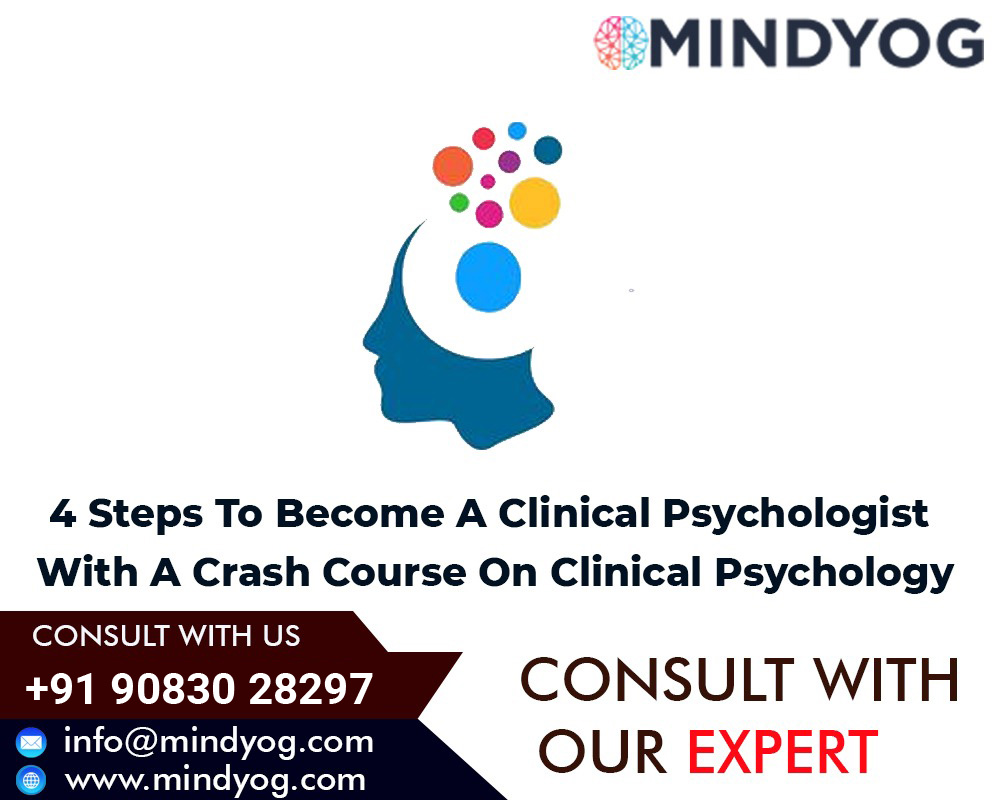Contents:
- Introduction
- Explaining clinical psychology
- The steps to become a clinical psychologist
- Step 1: Getting the bachelor’s degree
- Step 2: Getting the master’s degree
- Step 3: Getting the doctoral degree
- Step 4: Getting the license for the practice
- Conclusion
Everybody has days when they do not feel like themselves. These sentiments are natural for most individuals, and they do not endure long. However, for some, these sensations are more significant and may signal a major mental or emotional disorder and this is when the person must see a clinical psychologist. If you are interested in becoming a clinical psychologist then you need to have the required degree or pursue a crash course on psychology in Kolkata. But before that let us talk briefly about what clinical psychology is all about.
Explaining clinical psychology
Clinical psychology is a vast field of psychology that focuses on the diagnosis and treatment of mental, emotional and behavioural problems such as learning difficulties, substance misuse, depression, anxiety and eating disorders. Except in a few places, clinical psychologists do not have the authorisation to prescribe drugs to treat mental diseases. They instead employ psychological treatments including cognitive-behavioral therapy (CBT) and psychoanalytic therapy.
The steps to become a clinical psychologist
Clinical psychology is a demanding yet rewarding profession. To become a clinical psychologist, you must first complete your undergraduate degree, which typically takes four to six years. You will also need to complete your Ph.D. degree, which takes another four to seven years on average. Most clinical psychologists attend school for between eight and twelve years.
Of course, not everyone’s journey to become a clinical psychologist is the same. Some students choose an online crash course on clinical psychology, while others prefer a traditional classroom or a mixed method. In any event, it is vital to investigate each state’s psychologist licencing method, although they are the most typical.
Step 1: Getting the bachelor’s degree
A bachelor’s degree in psychology offers the foundation for pursuing master’s and doctorate degrees. While most clinical psychologists have a bachelor’s degree in clinical psychology, this is not required for all graduate schools. If you know you want to become a clinical psychologist and are enrolled in a bachelor’s degree programme, it is advised that you major in psychology since it will provide you with a greater range of graduate degree programmes to choose from later on in your career.
Step 2: Getting the master’s degree
When you are ready to pursue your master’s degree, you will have various options. Some undergraduate programmes lead to a master’s degree, allowing you to study at a faster pace, graduate sooner and start your Ph.D. programme. Depending on where you choose to study clinical psychology, you may not require a master’s degree and can instead enter a Ph.D. programme right away or pursue a crash course on clinical psychology.
Step 3: Getting the doctoral degree
Although certain jurisdictions recognise and provide restricted licensure to master’s-level psychological associates, enabling them to work within a restricted capacity and that too under the strict supervision and authority of licenced psychologists, full authority licensure in clinical psychology is always required. It takes about 5 to 7 years to complete a Ph.D., defend a dissertation and a rigorous test that you need to pass. In most situations, a one-year internship is also necessary. However, there are two Ph.D. programmes that you can choose from.
- A Ph.D. in Psychology or a Doctor of Philosophy in Psychology
- A PsyD or Doctor of Psychology
Step 4: Getting the license for the practice
Clinical psychology requires a licence to practice in all the states across the earth. Specific licence requirements vary based on where you reside and the sort of work you desire, however clinical psychologists in most states must:
- Get a Ph.D. in psychology.
- Complete an internship and 1-2 years of professional experience under supervision.
- Pass the Professional Practice in Psychology Examination.
Here, are a few of the fields in which clinical psychologists may be found:
- University-based research
- Psychology in the classroom
- Psychology in health care centers
- Psychology of physical health
- Volunteer with the elderly
- Work with children and students at the university level
With these steps, we are certain that you will be able to pursue a crash course on psychology in Kolkata and have a flourishing career. There will be no looking back for you and you will reach the very heights of success.
At MindYog, we assist you with a crash course on clinical psychology and teach you a detailed and structured syllabus. The certificate that you will receive at the end of the course will carry a lot of weight and you will be able to start your own practice in a chamber of your own or get associated with an organisation. Contact us for more details.
Review:
It has been a while since I have been attending the clinical psychology crash course. Not only is it great for my career but also educationally enriching. This crash course in clinical psychology is highly beneficial. – Mis Monali Raman

